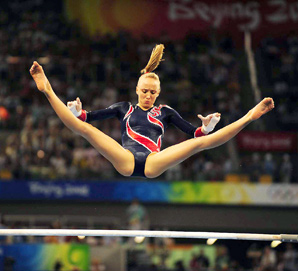
Questionable scoring, tiebreaker cost Liukin individual gold medal
Here's what happened: China's diminutive He Kexin started the bars competition with a risk-filled, six-release routine that was scored 16.725. She had a small step upon landing, and the difficulty of her routine was judged to be 7.7. Her execution score was 9.025.
Next up was Liukin. Fresh off her all-around gold medal and her floor exercise bronze, she was brimming with confidence as she approached her favorite event. (The 16.90 she scored in bars in the women's team finals was the highest score awarded in these Games.) She, too, had a 7.7 start value, and executed five release moves, having a little trouble in one, her pac salto, in which she goes from the high to the low bar executing a flip. Her landing, though, was perfect -- the first time this entire season she's stuck it. Her score: 16.725. Her execution score: 9.025. Same as He's numbers.
Yet, when the tally was flashed on the scoreboard, He was placed first, Liukin second. That's all Liukin noticed initially. Two more gymnasts had finished their routines before Nastia began to study the numbers. She studied them some more. She'd only had five hours sleep the night before -- she's too excited about the prospect of going home as the Olympic all-around champion to sleep -- so she was mentally fried. But pretty soon she nudged her father and coach, Valeri, and pointed out what most of those in the arena already knew: she had the same exact score as He, so why was He listed first?
Valeri didn't know. Very few people in the gymnastics community knew, including ex-Olympians providing expert commentary to listeners and viewers around the world. But as it turned out, the computers had to go to a third tiebreak before determining the winner.
First tiebreak is the start value. Identical.
Second tiebreak is the deductions taken by the middle four judges. That was also the same.
The third tiebreak -- hang onto your hats, for your brains are about to explode --was the average of the three lowest of the four counting judges' deductions. This is where Liukin lost.
Trust me on this: It's a goofy solution. The final tally was arrived at by using the Polish, New Zealand and Brazilian judges' deductions for He, and the Australian, New Zealand and Bulgarian's deductions for Liukin. The Australian judge, Helen Colagiuri, must have been watching another competition. She scored He's execution three-tenths of a point higher than Liukin's, despite the step He took on her dismount. None of the other five judges scored He's execution higher than a tenth above Liukin, and two of the judges -- from Poland and Bulgaria -- had Liukin's execution score two-tenths higher than He's.
In other words, it's all in the eye of the beholder. Either that, or there's some big time politics involved. Either way, the judging in gymnastics at these Olympics has been wildly erratic at best.
None of which was going to ruin Liukin's night. "I know I didn't have my best routine, but I had the same exact score as she did, which makes it a little harder to take," she said. "I still don't understand how they broke the tie, but that's the rules, and you just have to play by them. If it had happened in the all around, I would have been a lot more disappointed."
Liukin was also asked if the fact that He was one of the gymnasts suspected of being underage -- in May she was identified in a Chinese newspaper as being just 13 -- made the silver medal harder to swallow. But she wouldn't bite. "She's an excellent athlete no matter how old she is," she said.
Next up for Liukin is Tuesday night's balance beam event, in which she'll try to beat her father's total of four medals in an Olympics. Valeri had two golds and two silvers in 1988; Nastia has a gold, two silvers and a bronze in Beijing. Interestingly, one of Valeri's golds was won on the horizontal bar, in which he scored 19.90, exactly the same as his teammate Vladimir Artyomov. They shared the gold.
Too bad such a sensible solution wasn't applied in the case of his daughter.




